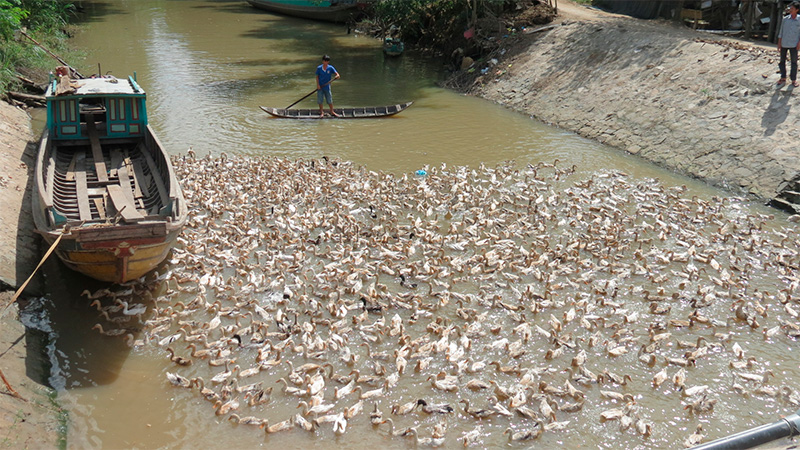Royal Veterinary College supports One Health Day
The RVC is putting on activities today to raise awareness of the One Health approach to medicine, and showcase the research undertaken to tackle major threats to human and animal health.
One Health is a growing principle which recognises that greater cooperation is needed between human medicine, veterinary medicine and environmental sciences in the fight against today’s major diseases. One Health Day is part of the international campaign to raise global awareness of the need for greater One Health collaborations. The rise in numbers of zoonotic diseases (diseases that can be passed from animals to humans) is a growing concern throughout the world. With recent worldwide disease outbreaks including Ebola, SARS, Avian Flu, Swine Flu, and BSE all potentially stemming from animal sources, the importance of the One Health approach to maintaining human health cannot be overstated.
One Health is therefore a major thread of inquiry at the RVC, where many research programmes are underway aimed at saving the lives of both humans and animals. With a recent growth in antimicrobial resistance making diseases increasingly difficult to treat, the need for a One Health approach continues to be relevant.Professor Stuart Reid, Principal of the Royal Veterinary College (RVC), and Professor Peter Piot, Director of the London School of Hygiene & Tropical Medicine (LSHTM), have publicly called on the Government to support a more collaborative approach to overcoming zoonotic diseases and antimicrobial resistance.

One of the many strands of research showcased at RVC today includes a current investigation focusing on the persistence of avian influenza in Vietnam. The background to the investigation is explained in a specially created video featuring Professor Dirk Pfeiffer and experts from Vietnam.
The associated virus was first introduced to Vietnam in 2003 and has since circulated in poultry throughout the country, becoming a public health and food security issue. It is thought that using free-grazing ducks to help farm the land, a long-standing farming tradition in South East Asia, has helped spread the virus as the birds are transported from rice paddy to rice paddy. Through their research, the RVC have discovered that the free-grazing ducks, which can carry the virus, are also exported for consumption to other neighbouring countries through informal trade and thereby bypass the influenza surveillance systems. The RVC’s research team have taken steps to raise awareness of how the use of free-grazing ducks as a farming method can spread avian influenza virus throughout Vietnam. Their strategy hinges on the belief that greater awareness of the problem will trigger improvements in animal hygiene, transport and quarantine, leading to better animal and human health, and sustainable animal production so this traditional production system can continue to be used without spreading avian influenza virus throughout the country and even to neighbouring ones.
Professor Dirk Pfeiffer, a specialist on Veterinary Epidemiology at the RVC, said: “Effective management of zoonotic diseases, such as highly pathogenic avian influenza, requires an understanding of the complex eco-social system within which the pathogen circulates. In the case of avian influenza, this involves studying the spill over of highly pathogenic avian influenza viruses from poultry to humans, the role of wild avian species as reservoirs of the virus and the circulation of the virus among different domestic poultry systems.
“This research project focusses on improving our understanding of moving free-grazing duck farming in terms of production dynamics and avian influenza virus spread in Vietnam. This particular production type is unique to specific ecosystems in South, South-East and East Asia, and is considered to play a key role in the continued presence of highly pathogenic avian influenza virus in our study country, Vietnam.”
As part of One Health Day, the RVC is putting on several events and activities at both its campuses in Hawkshead and Camden. These focus on raising awareness, seeking a common understanding about the One Health approach, and disseminating One Health work conducted at the RVC among staff, students and visitors. Outcomes of the research, case studies and interviews will be shared online and on social media to also engage the public. This includes a specially created video (below) featuring experts from the RVC and their project partners in Vietnam discussing the avian influenza research project.
One Health Day is an international campaign co-ordinated by the by the One Health Commission, the One Health Initiative Autonomous pro bono Team and the One Health Platform Foundation.
The Royal Veterinary College (RVC), as a joint partner with the London School of Hygiene and Tropical Medicine, provide a world leading MSc degree on One Health - One Health: ecosystems, humans & animals. The programme enables graduates to:
- Understand the One Health concept and approach problem solving using a trans-disciplinary methodology
- Understand the origin, context and drivers of infectious disease at the human, animal and environment interface
Press Office Contact
Uche Graves / Zoe White
T: 0800 368 9520
E: uche.graves@plmr.co.uk / zoe.white@plmr.co.uk
Notes to Editors
The Royal Veterinary College (RVC) is the UK's largest and longest established independent veterinary school and is a constituent College of the University of London. The RVC offers undergraduate, postgraduate and CPD programmes in veterinary medicine, veterinary nursing and biological sciences, being ranked in the top 10 universities nationally for biosciences degrees. It is currently the only veterinary school in the world to hold full accreditation from AVMA, EAEVE, RCVS and AVBC.
A research-led institution, in the most recent Research Excellence Framework (REF2014) the RVC maintained its position as the top HEFCE funded veterinary focused research institution.
The RVC also provides animal owners and the veterinary profession with access to expert veterinary care and advice through its teaching hospitals; the Beaumont Sainsbury Animal Hospital in central London, the Queen Mother Hospital for Animals (Europe's largest small animal referral centre), the Equine Referral Hospital, and the Farm Animal Clinical Centre located at the Hertfordshire campus.
RVC Press Release 02 November 2016
See other Press Releases.

